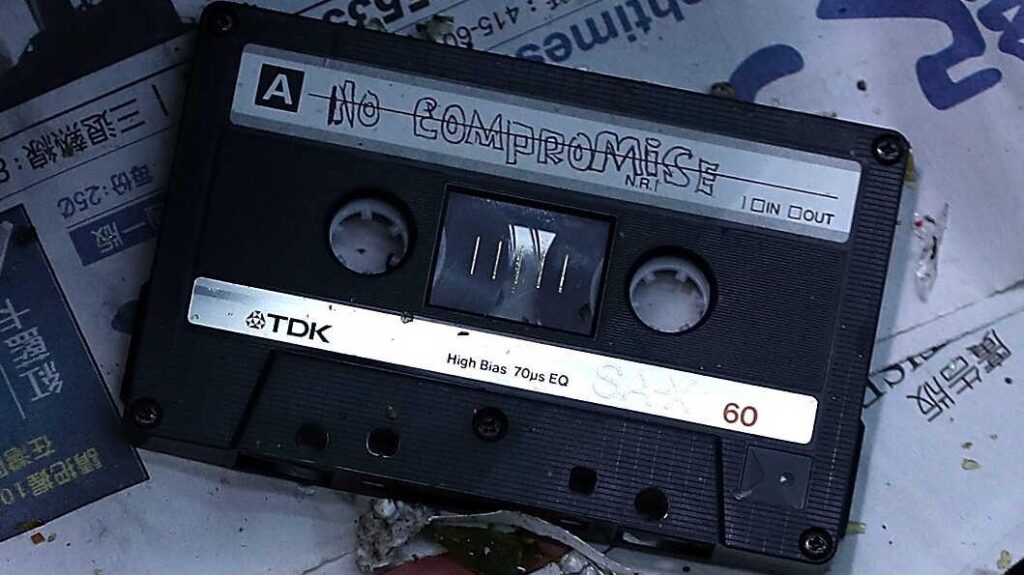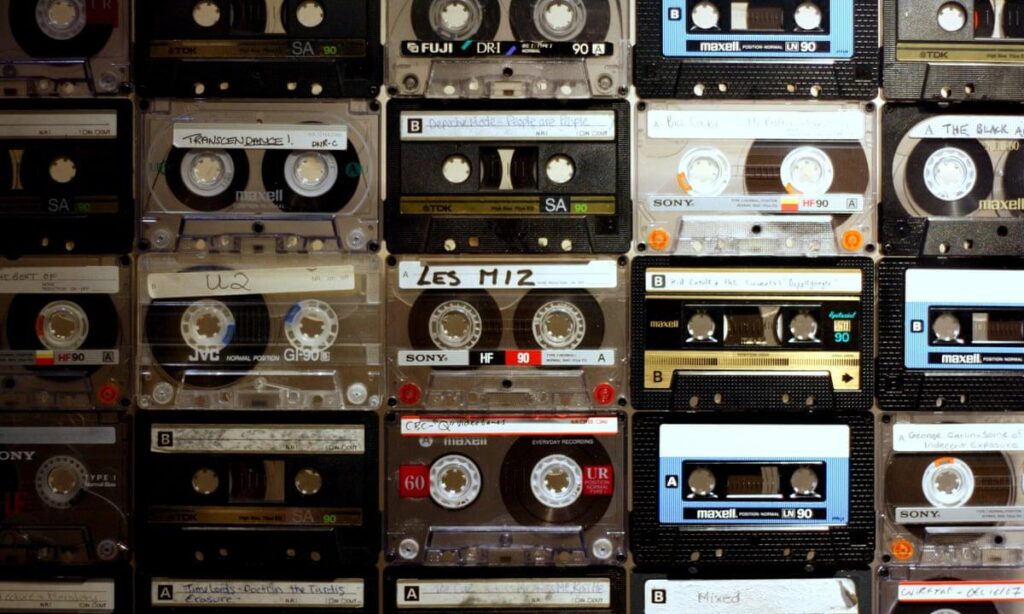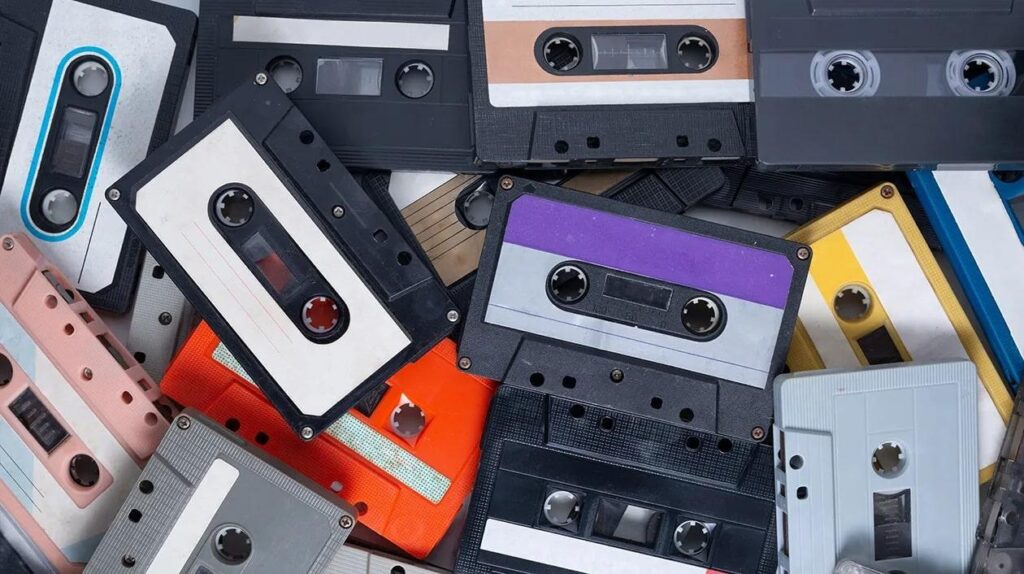As the world is occupied by the vast advancements of technology in every field, the music industry is not an exception. Considering all the modern formats available now for listening to songs and music, cassette tapes might seem like a thing of the past. However, these iconic analog systems are still around and have made a surprising comeback. So, this article will cover all the details you may need about their history and striking revival.
Part 1. A Brief Overview of the History of Cassette Tapes
The invention of cassette tape was a revolution that changed how we listened to and interacted with music. It was first invented by Lou Ottens and his team in the early 1960s at a Dutch company. Initially, the purpose of designing the cassette was not music but dictation. Later, it became even more famous for music due to its portable nature.

In the 1970s, this analog music system was even further extended by the introduction of cassette decks in cars. Then came Sony’s Walkman in 1979, a portable cassette player that revolutionized personal music consumption. After that, people could take their music anywhere with them and listen with ease.
Thus, this device became a prominent icon in the 1980s, facilitating the rise of the mixtape culture. However, the innovation and arrival of CDs and digital music systems led to their downfall due to their more accessible approach.
Part 2. Are Cassette Tapes Still Being Manufactured Today?
Evidently, the production of these tapes declined significantly with the rise of CDs and MP3 players. However, there’s been a comeback of this analogue format in recent years by a small group of people who appreciate the ancient sound of cassettes. This is because some people still consider the “Old is Gold†phenomenon worthy, giving them a sense of uniqueness.
The manufacturers have stopped making this old music platform, but some are still considering that it’s better to keep the format alive. Thus, even if they are not globally used and preferred nowadays, they are still made for those who value their tangible experience.

Part 3. Reasons Why Cassette Tapes Are Making a Comeback
Although digital music platforms offer us much more in features and accessibility, it’s still striking to know that there is still some demand left for the old system. With this, cassettes are making a comeback, and people are considering them for some particular reasons. That’s why this section will focus on mentioning those potential reasons for keeping cassettes alive.
- Nostalgia: One of the most prominent reasons for this is the nostalgia effect, where people miss their old days and experiences. It’s a natural impact to reminisce about our past exposures and want to go through them once again. So, people who grew up with cassettes are drawn back to the familiar format to enjoy the act of popping a tape in and holding an album in their hands.
- Tangible Ownership: Digital music platforms give us an excellent listening experience but don’t offer us a way where we can touch or hold them. In this regard, tapes provide a sense of ownership, and we can hold them and even create our mixtapes, which is a long-lost art.
- Lo-Fi Aesthetic: While the modern musical systems feature much more crisp and clear sound, some audiophiles may prefer the old classical touch in their music. Even if it’s not perfect and has some subtleness, they still like the unique characteristics it imparts to songs.
- Collectible Item: For younger generations that never experienced the usage of these tapes, it’s like a cool collectible they can keep for fun. As they are available in limited numbers and are found rare, the young people find them attractive to store.
- Artist Appeal: Some artists are now releasing their albums in special editions on cassettes as an amusement. This imparts a touch of uniqueness and rareness to their songs, leading to the comeback of the analog music experience.
Part 4. What are the Advantages of Using Cassette Tapes?
No doubt, the modern music platforms and formats give us an overall better experience, yet we can’t ignore the advantages we can get using tapes. Hence, we will let you explore all the benefits you can expect from the old analog musical format.
- Analog Sound Quality: The recordings on cassette tapes can produce a warmer and richer sound compared to even digital recordings sometimes. Also, the slight compression and natural distortion of tape saturation can add a pleasing and classical characteristic to the music.
- Durability and Portability: Evidently, cassettes are relatively durable and can withstand rough handling better than CDs and vinyl records. Plus, you can even carry them into your pockets or bags due to their small and portable size.
- Ease for DIY and Independent Artists: These tapes are inexpensive and easily accessible, allowing independent artists to easily produce and distribute their music. Moreover, DIY, associated with cassette culture, empowers artists to create and share their work outside traditional channels.
- Privacy and Security: Cassettes do not produce any digital footprint, offering privacy and security piracy and data tracking. Also, the audio stored on these tapes is not subject to hacking or digital corruption, providing a stable medium for long-term archiving.
- Cultural Expression: Creating mixtapes allows users to express themselves personally and can serve as a form of artistic storytelling. Besides, the satisfying design of their cases and inserts offers an additional canvas for artistic creativity.
Part 5. Detailed Tabular Comparison Between Analog and Digital Music
A cassette is an analog music format in which continuous fluctuations of sound are captured rather than breaking it into digital information. On the other hand, the digital music, like Spotify, Offers instant access to millions of songs and playlists on multiple devices with an internet connection. You can learn all about the critical differences between both platforms by going through the detailed comparison table below.
| Feature | Analog (Cassette) | Digital (Spotify) |
| Sound Quality | Warm, rich analog sound with natural distortion | Clear, precise digital sound with high-fidelity |
| Accessibility | Requires physical media and player | Instant access to millions of tracks online |
| Portability | Portable but bulky | Extremely portable; accessible on many devices |
| Cost | Low cost, but equipment needed | Subscription fees are required, but not physical media |
| Collectability | Tangible, collectible items with artwork and liner notes | No physical collectability |
| Durability | Prone to wear and tear, magnetic degradation | Digital files, no physical degradation |
| User Experience | Active, hands-on, sequential listening experience | Seamless, user-friendly, instant access |
| Security and Privacy | More secure; cannot be hacked | Less secure; prone to hacking |
Part 6. Tips to Clean and Maintain Cassette Tapes for Longevity
As we mentioned that tapes are prone to some wear and tears through continuous usage with the passage of time, there’s a need to learn how to maintain their condition. By achieving this, you can ensure their longer life span and preserve the quality of their music. This section will provide you will all the essential tips you can follow to keep your old music source with you forever.

- Proper Storage
Try to store the tapes in a cool and dry place, which can protect them against temperature and humidity. Besides, they should be kept away from electronic devices that generate magnetic fields, as these can distort the recorded audio. It’s also better to store them upright, like books on a shelf, to prevent warping and to reduce pressure on the reels.
- Regular Cleaning of Tapes
You can gently wipe the outer shell of the cassette with a soft piece of cloth to remove dust from it. Also, a can of compressed air can be used to blow away dust from their shell for a more thorough cleaning. Once you are done with that, ensure the tape is correctly aligned and not twisted before closing the housing.
- Maintaining Cassette Players
Another important tip is to regularly clean the tape heads in your cassette player with a cotton swab moistened with isopropyl alcohol. This will effectively remove the residue and ensure clear playback of this old format. Moreover, a head demagnetizer should be used periodically to remove any magnetic buildup on the heads, which can distort the sound.
- Handling Tapes
Handle the analog system by its shell and avoid touching the exposed tape to prevent it from getting oil and dirt from your fingers. Importantly, you should maintain your cassette decks to minimize wear and tear while playing music.Â
Furthermore, fast-forward and rewind the tape occasionally to ensure it is evenly tensioned. This can prevent tape stretching and reduce the risk of the tape sticking together.
- Repairing Damaged Tapes
If your cassette accidentally breaks, you can carefully put it back together using splicing tape. For this purpose, cut the damaged ends cleanly and align them together to avoid any empty space between them. However, in case the reels get broken, you can transfer the whole tape to a new shell, ensuring no twisting occurs.
Frequently Asked Questions
We have tried to cover almost every aspect related to the history and evolution of this old analog music format and how you can preserve it. However, we are now going to further assist you in this regard by providing you with some of the commonly asked queries and their appropriate answers:
Q1. Can I still use cassettes in this modern era?
Yes, you can use them as they are not extinct and are making their way back to some extent. Just get a nice tape deck and enjoy your music in the old format to have a classical experience.
Q2. Why did the tapes have a downfall?
With the advancement in technology in the music industry, CDs and MP3s offered a more portable and easier solution than tapes. That’s why people started to shift to the newer formats to cope with the trends, leading to the downfall of the analog music format.
Q3. Why do tapes sometimes sound distorted or have background noise?
These effects in the cassettes can be caused by several factors, including dirty tape heads or worn-out pressure pads. Nonetheless, you can easily manage them by regularly cleaning all the parts and the capstans in your player to remove residue. Also, magnetic and physical damage can affect the playback quality of these analog music systems.
Q4. How do cassette tapes compare to other music formats in terms of sound quality?
These analog formats generally offer lower sound quality than digital formats like CDs or streaming services with a narrower frequency range. However, some audiophiles appreciate the warm, analog sound of cassettes, which can add a unique touch to the music.
Q5. Are cassette tapes still being produced and sold today?
While they may not be as widely available as they were in their prime era, a few companies continue to manufacture new cassettes. They are often found in specialty music stores, online marketplaces, and at concerts where independent artists sell them directly.
Conclusion
In conclusion, despite the dominance of digital music formats, cassettes are still preferred by some of the audiophiles. This article has shared with you a detailed history of the rise and downfall of this analog music format.
Also, we have provided you with a comprehensive comparison table between the two to get a better understanding of their distinct features. As a bonus, we have even listed some valuable tips to help you preserve your tapes for more extended periods.
Medical Equipment Cable,Hospital MRI Cable,MRI Cable,MRI Signal Cable
Dongguan Yiyou Electronic Technology Co., Ltd. , https://www.yiucn.com